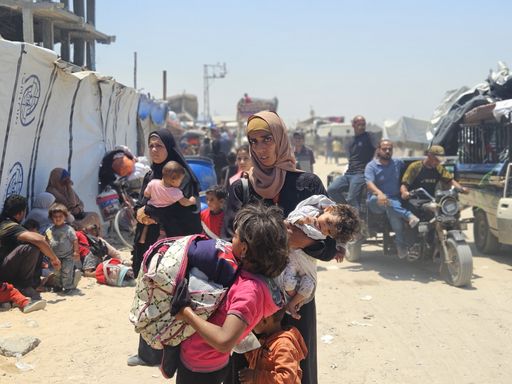Israel's latest plan to build a so-called "humanitarian city" of tents on the ruins of Rafah in southern Gaza is being condemned as an attempt at large-scale forced displacement of Palestinians under the guise of aid, amid its ongoing genocide in the enclave.
In a briefing on Monday, Israeli Defence Minister Israel Katz revealed details of a plan to relocate around 600,000 Palestinians in an initial phase to a fenced-off area built on the rubble of Rafah after a ceasefire deal is reached, subjecting them to strict security screenings and preventing them from leaving the site.
According to Israel's state broadcaster KAN, the plan is part of a broader strategy to push Palestinians out of Gaza altogether, with the proposed "tent city" located between the Philadelphi Corridor and Morag Corridor in the south.
The next phase would reportedly see all remaining Palestinians in Gaza gathered into the fenced zone, before encouraging what Israel labels "voluntary migration" to other countries.
Israel's Haaretz slammed the plan in an editorial on Wednesday, calling it a "criminal transfer" masked in "humanitarian" language, comparing it to an open-air detention camp that Palestinians would only leave by accepting permanent exile.
The editorial said the scheme reflected a moral collapse, mocking Israel's attempts to dress up military repression in euphemisms like "the most moral army in the world."

Series of failed plans
Israel's plan echoes earlier displacement strategies since October 7, 2023, when the genocide in Gaza began.
One was the so-called "Generals' Plan" that aimed to empty northern Gaza, including Beit Hanoun, Beit Lahia and Jabalia, by pushing civilians south toward the Netzarim Corridor.
The plan was publicly revealed by Israeli media in September 2024 and was meant to create closed military zones. But months later, Israeli forces withdrew from much of the north amid fierce resistance, with Giora Eiland, the plan's architect and former National Security Council head, acknowledging its failure in April 2025.
In November 2024, Haaretz also reported on another plan to divide Gaza into four isolated "bubbles" to keep Palestinians separated based on alleged affiliation with resistance factions.
The Wall Street Journal confirmed that the goal was to allow people to stay only if they were unaffiliated with Hamas, but that plan also collapsed due to continued resistance and residents' refusal to abandon their land.

'No part of this is humanitarian'
On Thursday, the UN agency for Palestinian refugees (UNRWA) condemned Israel's "humanitarian city" proposal as a blatant attempt at forced relocation.
Tamara Alrifai, UNRWA's director of external relations and communications, said calling the plan "humanitarian" is "an insult to the very notion of humanity" and warned it would turn Gaza, already the world's largest open-air prison, into "the most overcrowded, controlled open-air prison in the world."
She added that forcing more than 600,000 people into such camps near Egypt's border would create massive detention-like conditions.
UNRWA Commissioner-General Philippe Lazzarini warned that the only real path forward is a permanent ceasefire, the release of hostages, safe humanitarian aid delivery and a genuine commitment to a two-state solution.

Community structures undermined
In parallel, Israel has reportedly tried to bypass official Palestinian institutions by distributing aid through tribal leaders in Gaza to weaken community cohesion and diminish the influence of local factions. But that effort failed due to widespread public distrust.
Last September, Prime Minister Benjamin Netanyahu acknowledged in a closed-door Knesset meeting that the attempt to channel aid through clans had backfired.
Analysts say these repeated displacement and fragmentation schemes reveal Israel's broader goal of engineering Gaza's demographic and political reality, but months into its carnage, they have largely failed in the face of Palestinian steadfastness.

Israel's carnage in Gaza
Israel has killed over 57,800 Palestinians, mostly women and children, in Gaza since October 7, 2023.
Some 11,000 Palestinians are feared buried under rubble of annihilated homes, according to Palestine's official WAFA news agency.
Experts, however, contend that the actual death toll significantly exceeds what the Gaza authorities have reported, estimating it could be around 200,000.
Over the course of the genocide, Israel reduced most of the blockaded enclave to ruins and practically displaced all of its population.
It has also blocked the entry of desperately needed humanitarian aid, and only allowed a controversial US-backed aid group that was established to bypass the UN aid work and was condemned as a "death trap."



















